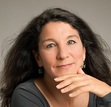Susan Rich's Blog, page 24
October 2, 2014
10 Things to Consider When Conducting Creative Research and Hannah Maynard
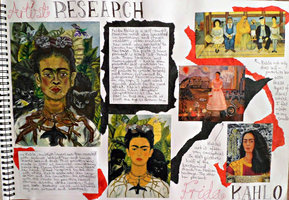 Frieda Kahlo: a lucky artist time has not forgotten
Frieda Kahlo: a lucky artist time has not forgottenWhat is creative research? This topic takes a little explaining. For my last two books Cloud Pharmacy and The Alchemist's Kitchen, I wrote poems based on the art work and the lives of two obscure women photographers: Myra Albert Wiggins and Hannah Maynard. This was a great surprise, at least to me. My experience with photography and historical sources was "elementary" to put it nicely.
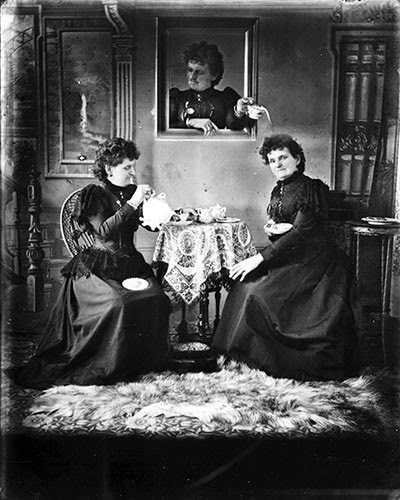 Hannah Maynard, trick photograph, multiple exposure, c. 1893 Courtesy of the Royal British Columbian Museum
Hannah Maynard, trick photograph, multiple exposure, c. 1893 Courtesy of the Royal British Columbian Museum As a poet who has been writing and publishing for something like 20 years (how did that happen?) I am rather tired of my own life --- even though it has been lived on three continents and in several professions --- I'm much more interested in the not me. And in this way, conducting creative research on women artists makes complete sense.
Five poems based on Maynard's photographs are in the recent issue of Common-Place. There's also an accompanying essay on writing this sequence of poems. Common-Place is an on-line journal that describes itself this way:
Common-place is a common place for exploring and exchanging ideas about early American history and culture. A bit friendlier than a scholarly journal, a bit more scholarly than a popular magazine, Common-place speaks--and listens--to scholars, museum curators, teachers, hobbyists, and just about anyone interested in American history before 1900.
Here are a few things I've learned along the way about conducting historical research for poems:
1. Women artists need us. There are many women artists that produced incredible bodies of work; yet today they are almost completely forgotten. Even more surprisingly, the work reads as radical even in 2014. Lenora Carrington, Baroness Elsa, and Hannah Maynard to name a few.
2. History and poetry share certain elements. Like poetry, history needs to be concise. It leaves out more than it says. For both the poet and the historian, questions are what compel us.
3. Learning about photography, or oil painting or sculpture, or old cars --- it all leads into new language. The language of photography deals with light and time. Sounds like poetry to me: shadows, reflection, aperture, lens. And so much more.
4. You can make things up. Yes, I know historians will squirm as I say this but as poets we go beyond dates and verifiable facts. Someone recently wrote to me and said she had lost a daughter in the last year. The Hannah Maynard poems spoke to her. This is the kind of truth that matters to me far more than a verifiable time line of events.
5. Best not to read too much before you start writing. See above. I'm happiest when I know just a few facts and can write into the open spaces. Mark Doty says ekphrastic poetry comes out of our own longings. The visual image is an anchor for our own interior lives.
6. Go slowly. With each of my ekphrastic projects I took a few years before I could write the poems that made it into the books. Writing from historical images and documents is challenging.
7. Yes, you get to time travel. As a child I loved all books by Edward Eager and Edith Nesbit. Books that allowed you to walk through a garden or rub a small coin and be transported. Studying women artists has done this for me. I now feel that the late 19th century with the advent of train travel and the telegraph was similar to the times we live in.
8. Be open to different ways of writing. This was crucial for my work on Hannah Maynard. I needed a syntax and attitude different than what I had had available before this project.
9. Writing a sequence is different than writing a single poem. Forgive me for stating the obvious. This means that using epigraphs will help in bringing readers if you want to publish these poems individually. Remember the reader does not know all that resides inside your head.
10. Persona poems, ekphrastic poems, list poems: all of these forms and many others lend themselves to historical work. In other words, you get to recreate an entire world. And then enter it.
Published on October 02, 2014 09:48
September 29, 2014
Meet Editor and Poet Kelly Davio: Co-founder of the Tahoma Literary Review
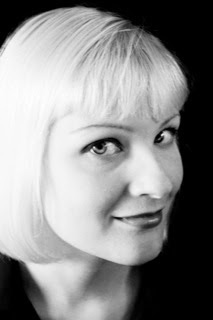 Poet, Editor, and Co-founder of TLRI first met Kelly Davio through a women's promotional book group -- BookLift -- that I founded four years ago. Kelly was new to the area and it was immediately apparent that she was full of energy and intelligence when it came to the world of books, journals, and the publishing world. It was also apparent that she was generous and had an open heart. The Tahoma Literary Review has just released its first issue --- and you can download it for free or better yet, for a small donation. In view of full disclosure, my poem, "Sunday Evening Retrospect" is included in this issue. You can see what Kelly writes about publishing people she knows -- it may surprise you. In a good way.
Poet, Editor, and Co-founder of TLRI first met Kelly Davio through a women's promotional book group -- BookLift -- that I founded four years ago. Kelly was new to the area and it was immediately apparent that she was full of energy and intelligence when it came to the world of books, journals, and the publishing world. It was also apparent that she was generous and had an open heart. The Tahoma Literary Review has just released its first issue --- and you can download it for free or better yet, for a small donation. In view of full disclosure, my poem, "Sunday Evening Retrospect" is included in this issue. You can see what Kelly writes about publishing people she knows -- it may surprise you. In a good way.Kelly Davio is the Poetry Editor and Co-Founder of Tahoma Literary Review. She is the author of the poetry collection Burn This House (Red Hen Press, 2013). Her work has appeared in Best New Poets, Verse Daily, The Rumpus, and others. She earned her MFA in poetry from Northwest Institute of Literary Arts, and teaches English as a Second Language in the Seattle area.
1. What was your impetus for beginning TLR — is there an inception story?
My cofounder, Joe Ponepinto, and I worked together for some years on another journal, I as managing editor and Joe as book reviews editor. When we both moved on from that project, we knew we wanted to continue to work together in some capacity, and we kicked around a number of ideas for what our next venture could be. We had no desire to simply add another literary journal to a world that's already teeming with magazines. Instead, we wanted to address what we see as a hole in the literary marketplace; when we took the time to really listen to writers' wants, we heard that people were looking for publications that pay writers, and for more fair and transparent editorial policies.
2. Now that the first issue has hit the net and the physical book shelves, what have you learned about this endeavor that surprised you?
When Joe and I began to work on a business plan for the journal last fall, we kept transparency and payment at the forefront of our priorities, and we spent a few months working through a variety of different financial scenarios in order to arrive at our current business model. Rather than simply plunging ahead with a concept, we spent quite a bit of time developing solid answers to tricky questions: how could we ensure payment for our writers in every issue, every time? Where could we eliminate typical costs inherent in running a literary journal? How would we make our processes as open and clear to our submitters as possible? We're pretty pleased to be literary people who've managed to also be businesspeople enough to create a sustainable journal without institutional funding.
But we've had some great surprises, too. We've been overwhelmed by the positive response writers and readers have had to our journal. The number of submissions we received for our first issue exceeded our expectations, and we've been equally surprised by the number of readers we've garnered for this issue. We so often hear that "nobody reads journals these days," but in the one month following the issue's release, about one thousand people have downloaded or ordered a copy of the journal. That tells us that, yes, there is a readership for great literary writing!
3. I love that you’ve set-up a structure that includes paper and on-line formats. What was your thinking on this?
Our goal is to get as many people as possible to read the great work in our pages. Some people will only read books in print, and have a devotion to the physical book. Other people want to have the portability and accessibility inherent in the digital text. So often, the choice between print and e-reader formats feels like picking sides in an ideological battle, and we didn't like that. Instead of choosing a single method of presenting work to readers, we wanted to give people as many opportunities to enjoy the journal as possible. Luckily for us, we have great in-house knowledge of both traditional and e-reader book production and formatting, so we were able to start distributing the journal in both formats from the get-go.
4. The transparency with which you’ve set-up your journal is impressive. Has that caused problems with writer friends that you do no solicitations? How have you handled that?
You know, I've always avoided soliciting friends for work, even when working on journals that openly solicited! I never wanted to give anyone the slightest reason to feel that his or her work would only be published if he or she had an "in." (That probably says more about my own self-doubt as a writer than it does about other people's mindsets.) So not receiving solicitations from me is nothing new to my writer friends! I like to think that my literary friends can see the enthusiasm I have for a policy of fairness, and that they'll be on board with the idea.
5. I’m assuming TLR is a labor of love and the funds you receive go out to the writers. You are volunteering hours of your time that you could be writing or sleeping or hanging out with a friend. What motivates you to do this work?
TLR is definitely a labor of love. We hope that one day, each of our editors will receive some a monetary compensation, but for now, we're happy to put the publishers' share of TLR's earnings right back into payment for writers. Even though we are a journal that is dedicated to paying our writers--not because we're setting a monetary value on art, but because we believe art should be valued in our culture--Joe, Yi Shun and I don't do this for the money. We simply love good writing, and we love writers. We want to showcase great work from a genuinely diverse range of writers, and we want to help artists to grow their careers. Making connections with writers and helping their work find an audience is tremendously rewarding, and we hope to be doing this work for years to come.
Published on September 29, 2014 10:46
September 26, 2014
Road Trips, Revelations, and Poetry Readings
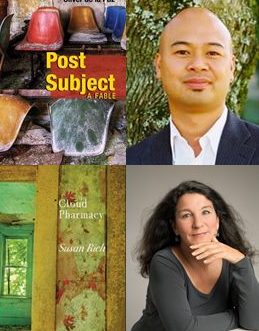 Oliver de la Paz and I @ Village Books Oct 2nd
Oliver de la Paz and I @ Village Books Oct 2ndI think the point of poetry readings is to bring people together. I like to hear the stories behind the poems and to listen to the voice of the poet. Oftentimes I need that pattern of tones and syllables in order to understand how to read a writer's work. As a poet who is reading out a goodly amount this fall, I like to think about what makes a good poetry reading.
Next Thursday, October 2nd I will read with the wonderful Olive de la Paz at Village Books in Bellingham, WA. The following night, Friday, October 3rd, I'm reading for the Words, Writers, West Seattle Series, a program of the Southwest Historical Society, and talking about how to conduct historical research for creative purposes.
But what I am most excited about is the new WordsWest Series that I'm curating with Katy Ellis and Harold Taw at C & P Coffee Company. Each month we invite the West Seattle community to come hear world class writers and help us nurture the West Seattle literary community. As new curators, all well published, we want to do something different with this series --- and so far --- we are. Next up is "Politics and Poetics: Rick Barot and Lena Khalaf Tuffaha."
What if someone telephoned to say you had 3 minutes to run for your life? What if a bomb was about to be dropped on your family’s home? Can words ever do justice to the shock, bewilderment, and fear that such wartime “courtesy” calls provoked during this past summer in Gaza?
*******
For the October 15, 2014 edition of WordsWest Literary Series, poets Rick Barot and Lena Khalaf Tuffaha will read their work and explore with the audience how poetry confronts what is painful, confounding, and divisive in our human experience. Can we draw closer together by delving more deeply into our complicated cultural heritages, lost histories, and political struggles?
Rick Barot is the author of three poetry collections with Sarabande Books: The Darker Fall (2002); Want (2008); and Chord (forthcoming 2015). He has received fellowships from the National Endowment for the Arts, Artist Trust, the Civitella Ranieri Foundation, and Stanford University. His poems and essays have appeared in numerous publications, including Poetry, The Paris Review, and The New Republic. Rick is the poetry editor of New England Review. He lives in Tacoma and teaches at Pacific Lutheran University. He is also the director of The Rainier Writing Workshop, the low-residency MFA in Creative Writing at PLU.
Lena Khalaf Tuffaha has lived the experiences of first-generation American, immigrant, and expatriate. In the summer of 2014, her poem “Running Orders”—written from the voice of a Palestinian evacuee in Gaza—went viral online. Her heritage is Palestinian, Jordanian, and Syrian and she is fluent in Arabic. She has lived in and travelled across the Arab world, and many of her poems are inspired by the experience of crossing borders: cultural, geographic, political, borders between the present and the living past. She translated the screenplay for the award-winning film “When I Saw You”, written and directed by Annemarie Jacir in 2011. She has poems in Floating Bridge Review, Taos International Journal of Poetry and Art, and in the print anthology Being Palestinian, to be published by Oxford Press in 2015.
Published on September 26, 2014 16:41
September 20, 2014
Top 10 Things to Consider When Sending Your Work for a Contest or Residency
 Rule #1 - Stand OutThis week I have judged two poetry contests and reviewed residency applications back to back. It's a perfect time to consider what makes a judge put your work into the "read again" pile rather than the "no thank you" pile. As a poet who has been on both sides of the desk, here's what I've learned.
Rule #1 - Stand OutThis week I have judged two poetry contests and reviewed residency applications back to back. It's a perfect time to consider what makes a judge put your work into the "read again" pile rather than the "no thank you" pile. As a poet who has been on both sides of the desk, here's what I've learned.1. Subject matters. The poems I'm reading for this contest are almost exclusively: natural world is transformative, loss of a loved one, a childhood memory. Any poem that goes outside that triad I put in the "read again" file.
2. Humor is great when it works... Oftentimes it doesn't. Maybe check-in with writer and non writer friends to see if what you think is funny resonates.
3. "Poetry" words (such as dance, twirl, illuminate, or any gemstones) need to go. It's like fingernails on a chalkboard.
4. As a general rule, poems shouldn't go beyond the page. This was my feeling as I read hundreds of entries.
5. One line that's off, one word that's off, can make a difference.
6. Endings need all your attention. So many poems begin strong and then falter as they move towards the middle of the poem. The end of the piece is what leaves a lasting impression.
7. Judges are fickle. What I am telling you as a judge of chapbook prizes and residency programs might be very different than what another judge would say. Each year judges change and so your chances for the same contest will be fresh each year.
8. Winning is, in part, a numbers game. The poets I know who seem to be winning everything apply for at least 5 times more than they win. They are actually terrific losers. They just aren't afraid to play.
9. Persistence pays off. The poet Spenser Reece who this year is up for a National Book Award had his first manuscript rejected over 200 times. 200 times.
10. Believe in your work; send wild cards. Every time you send your work into the world you are saying Yes! to possibility. Yes to mystery. Yes to deserving an audience. My poems that have won contests were never the ones I thought were contest worthy. Always it has been a surprise poem that I sent as a wild card.
If you have added tips and suggestions, please add them in the comments box. A community of helpful writers is beneficial to us all. Get your poems out now --- contests are waiting for you.
Published on September 20, 2014 11:06
September 16, 2014
Longlist for the National Book Award in Poetry Just In!
Congratulations to all --- but especially to Spenser Reece!Here's the longlist for the National Book Award in Poetry!
Roget's Illusion
Linda Bierds
(G.P. Putnam's Sons/ Penguin Group (USA))
A Several World
Brian Blanchfield
(Nightboat Books)
Faithful and Virtuous Night
Louise Glück
(Farrar, Straus and Giroux)
Gabriel: A Poem
Edward Hirsch
(Alfred A. Knopf/ Random House)
Second Childhood
Fanny Howe
(Graywolf Press)
This Blue
Maureen N. McLane
(Farrar, Straus and Giroux)
The Feel Trio
Fred Moten
(Letter Machine Editions)
Citizen: An American Lyric
Claudia Rankine
(Graywolf Press)
The Road to Emmaus
Spencer Reece
(Farrar, Straus and Giroux)
Collected Poems
Mark Strand
(Alfred A. Knopf/ Random House)Like
Roget's Illusion
Linda Bierds
(G.P. Putnam's Sons/ Penguin Group (USA))
A Several World
Brian Blanchfield
(Nightboat Books)
Faithful and Virtuous Night
Louise Glück
(Farrar, Straus and Giroux)
Gabriel: A Poem
Edward Hirsch
(Alfred A. Knopf/ Random House)
Second Childhood
Fanny Howe
(Graywolf Press)
This Blue
Maureen N. McLane
(Farrar, Straus and Giroux)
The Feel Trio
Fred Moten
(Letter Machine Editions)
Citizen: An American Lyric
Claudia Rankine
(Graywolf Press)
The Road to Emmaus
Spencer Reece
(Farrar, Straus and Giroux)
Collected Poems
Mark Strand
(Alfred A. Knopf/ Random House)Like
Published on September 16, 2014 12:18
September 13, 2014
Projects Keeping Me Busy - WordsWest, Gaza, and Poets on the Coast 2015
 WordsWest at C & P Coffee I can't tell you how excited I am to be working with Harold Taw and Katy Ellis on this brand new arts series: WordsWest Literary Series happening at 7 pm this Wednesday, September 17th at C & P Coffeehouse in West Seattle.
WordsWest at C & P Coffee I can't tell you how excited I am to be working with Harold Taw and Katy Ellis on this brand new arts series: WordsWest Literary Series happening at 7 pm this Wednesday, September 17th at C & P Coffeehouse in West Seattle. Our line-up for Fall is pretty awesome In the fifteen years I've lived in West Seattle there has never been a literary series in any coffeehouse, arts center, bookshop, or other venue --- at least not that I've been aware of. And now, five minutes after meeting Katy Ellis for the first time and then inviting Harold to participate...Well, we have a really exciting group of writers in a superb coffee shop. And we have area businesses participating in the Favorite Poem Project by reading one poem that has meant something to them in their lives and sharing it with the audience. We're also archiving every reading and creating a podcast -- with the authors' okay.
Our line-up for Fall is pretty awesome In the fifteen years I've lived in West Seattle there has never been a literary series in any coffeehouse, arts center, bookshop, or other venue --- at least not that I've been aware of. And now, five minutes after meeting Katy Ellis for the first time and then inviting Harold to participate...Well, we have a really exciting group of writers in a superb coffee shop. And we have area businesses participating in the Favorite Poem Project by reading one poem that has meant something to them in their lives and sharing it with the audience. We're also archiving every reading and creating a podcast -- with the authors' okay.And what else has been happening? Well, I was honored to be invited by Elizabeth Austen, Washington State Poet Laureate to read my poems on the Seattle NPR affiliate, KUOW. This was especially meaningful to me because I am reading and talking about my time in Israel and Palestine. You can listen here just click on Listen to the Story.
 New home for Poets on the Coast 2015
New home for Poets on the Coast 2015Finally, just back from a wonderfully successful Poets on the Coast 2014, Kelli Agodon and I are deep into planning for Poets on the Coast 2015 --- the 5th Anniversary of our Poets on the Coast retreat for women. This year we added a collaboration with the fabulous Northwest Museum of Modern Art (NoMA) which gave poets full run of the museum to write ekphrastic work which will soon be published by NoMA on their website. Stay tuned!
I think there are several more projects and readings happening. For example Kelli Russell Agodon and I read for LitFix at the Rendezvous Room next Thursday, September 18th. We'd love to see you.
Published on September 13, 2014 10:46
August 29, 2014
Preparing for Poets on the Coast (or the Channel) in La Conner
 One week out and we're still having fun This is the fourth year that my magical friend, poet Kelli Russell Agodon and I are bringing together a community of women for a long weekend of writing, laughing, rewriting, and learning from each other. It's almost midnight and this is the third day in a row I have been writing new poetry prompts, organizing lists, talking with the hotel's special events manager and generally getting ready for another weekend of creative energy, craft, and fun.
One week out and we're still having fun This is the fourth year that my magical friend, poet Kelli Russell Agodon and I are bringing together a community of women for a long weekend of writing, laughing, rewriting, and learning from each other. It's almost midnight and this is the third day in a row I have been writing new poetry prompts, organizing lists, talking with the hotel's special events manager and generally getting ready for another weekend of creative energy, craft, and fun.Kelli and I work on Poets on the Coast for nine months of the year --- dreaming, planning, organizing. It's hard to believe that the ideas we hatch over coffee and chocolate are (hopefully) about to come true.
It's a very liberating, almost ecstatic, feeling to dream something up and then have it unfold before you. The first year Kelli and I brought together a group of 18 women in Nye Beach, Oregon was utterly surreal. As we detoured around the interstate closed due to a prairie fire (in Oregon!) I realized we had planned an opening wine and cheese reception for the poets without knowing where it would be held. We arrived at the hotel with 40 minutes to organize a party (and find the right party room).
We've learned a bit over the last four years beginning with: always arrive the day before events begin.
Each year there is a break through or celebration for one of the women that stays with me, that makes me feel Kelli and I are doing something good in the world: it might be one woman's first time doing yoga or another woman writing a heart wrenching poem that had the group in tears --- her first poem ever --- as she had considered herself a fiction writer. "
Over the years friendships have solidified and other poetry events have been started from this group.
Sure, some women move on to begin graduate school or for other activities. And yet each year the women who are meant to be with us come together in one last gasp of summer. Over half of this year's group are women who are returning poets. Radical hospitality' is a phrase coined by Amy Wheeler, director of Hedgebrook but I believe it applies to Poets on the Coast as well. We do our best to shower the group with inspiration, support, and try to focus on what each woman most needs in a quick one on one session.
As usual, I'll bring the homegrown sungold tomatoes and Kelli will make her blackberry cobbler. Food is a central part of the hospitality and thus the poetry of the weekend. From age twenty-something to seventy-something, from different backgrounds and points across the country, we come together.
I suppose the takeaway is if there is something in your life that you're dreaming about doing --- just do it. And if you can, it's great to do it with a friend.
We're thrilled for this year and already looking forward to our fifth anniversary in 2015.
Published on August 29, 2014 00:30
August 7, 2014
Robert Lowell and Elizabeth Bishop on the Beach
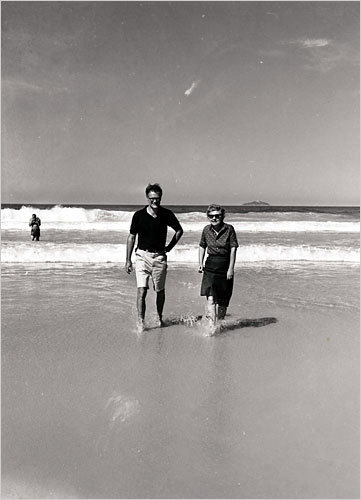
Brazil? Cape Cod? Key West? Two friends emerging from the sea or tumbled down from the sky. Why? Because it's summer.
Published on August 07, 2014 00:16
August 5, 2014
I Love Poems on the Radio - Thank You Elizabeth Austen and KUOW
 The Wall or Al Baraq - to the left is the Dome of The RockLast night I arrived back in town and this morning my poem, "The Wall" was featured on Morning Edition on our NPR Seattle affiliate, KUOW. Within minutes, three friends emailed me to tell me they had heard the poem while driving to work or making their morning coffee.
The Wall or Al Baraq - to the left is the Dome of The RockLast night I arrived back in town and this morning my poem, "The Wall" was featured on Morning Edition on our NPR Seattle affiliate, KUOW. Within minutes, three friends emailed me to tell me they had heard the poem while driving to work or making their morning coffee. Here in Western Washington we are extremely lucky to have Washington State Poet Laureate Elizabeth Austen producing interviews and readings with local poets for different news and art-based shows.
Maybe it's just me but the idea that an award winning news show is willing to include poetry seems a testament to Elizabeth's consistent ability to match serious poets with news headlines. I love that my poem becomes part of the conversation on what is happening in Israel and Gaza --- a poem I wrote long before this current crisis. A poem which gives a brief historical window into what is happening now.
A little background. The Wall or Al Buraq is a sacred space for people of both Jewish and Muslim faiths. It is the outside wall of the Temple Mount. The area was "won" by Israel from Jordan (who for 19 years had control) in the Six Day War in 1967. Within three days Israel had bulldozed the 770 year old Moroccan quarter --- all mosques and homes destroyed. I hope the poem makes sense without that information but I always like having some context.
*******
Of all the ways that poems come to me: in books, at readings, through the voice of a friend, it is via radio that I love best. I still remember being in graduate school and buying a book of Adrienne Rich's poetry - Midnight Salvage - which was packaged with a cassette tape (!) that included Rich's reading of the poems. I drove around Eugene, Oregon listening to the poet as I drove down Alder and 13th. The interior of my Toyota became a chapel for poetry and Adrienne Rich, my close friend as she spoke to me through the speakers. We traveled together frequently.
Twelve or more years ago when Elizabeth started producing poetry segments for KUOW, I was thrilled. I can still remember hearing poems by Kathleen Flenniken and John Marshall on a weekday afternoon, joining me as I left work.
I am so thankful that she is still committed to bringing poetry to the airwaves.
The Wall What superstition and fanaticism on every side.
~Theodore Herzl
We Jews slip secrets inside cracked mortar
the flap of an envelope
half a postcard from home.
Call them prayers or wishes,
reasons why one must travel continents
to ask in-person
for advice or apology.
Here is the mailbox of God
where a woman walks backwards
after praying, never turning
her back to the wall.
Above her head tiny airplanes
originate explosions
scuttle across orchid blue sky
intent on their military exercise.
A hard light binds weathered stone
bleaches the guard-studded square
where a neighborhood was razed in a night.
Mosques and homes. Mosques and homes.
Published on August 05, 2014 13:15
July 30, 2014
For These Times: One of My Literary Heroes
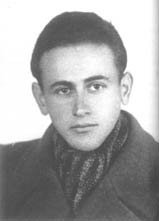 One of my literary heroesPaul Celan (1920-1970) is a poet that I read again and again, there is so much to absorb. I've spent all morning trying to get these line breaks right and my sincere apologies if it doesn't transfer onto the web quite right. I need to read his work again right now. I'm especially in need of this quote:
One of my literary heroesPaul Celan (1920-1970) is a poet that I read again and again, there is so much to absorb. I've spent all morning trying to get these line breaks right and my sincere apologies if it doesn't transfer onto the web quite right. I need to read his work again right now. I'm especially in need of this quote:Only one thing remained reachable, close and secure amid all losses: language. Yes, language. In spite of everything, it remained secure against loss. But it had to go through its own lack of answers, through terrifying silence, through the thousand darknesses of murderous speech. It went through. It gave me no words for what was happening, but went through it. Went through and could resurface, 'enriched' by it all.
Here is one of my favorite poems of all times. Thank you to Peter Aaron for first introducing the work of Paul Celan to me.
Fugue of Death
Black milk of daybreak we drink it at nightfall
we drink it at noon in the morning we drink it at night
we drink it and drink it
we are digging a grave in the sky it is ample to lie there
A man in the house he plays with the serpents he writes
he writes when the night falls to Germany your golden
hair Margarete
he writes it and walks from the house the stars glitter he
whistles his dogs up
he whistles his Jews out and orders a grave to be dug in
the earth
he commands us strike up for the dance
Black milk of daybreak we drink you at night
we drink you in the morning at noon we drink you at
nightfall
drink you and drink you
A man in the house he plays with the serpents he writes
he writes when the night falls to Germany your golden
hair Margarete
Your ashen hair Shulamith we are digging a grave in the sky it is
ample to lie there
He shouts stab deeper in earth you there and you others
you sing and you play
he grabs at the iron in his belt and swings it and blue are
his eyes
stab deeper your spades you there and you others play on
for the dancing
Black milk of daybreak we drink you at nightfall
we drink you at noon in the mornings we drink you at
nightfall
drink you and drink you
a man in the house your golden hair Margarete
your ashen hair Shulamith he plays with the serpents
He shouts play sweeter death’s music
death comes as a master from Germany
he shouts stroke darker the strings and as smoke you
shall climb to the sky
then you’ll have a grave in the clouds it is ample to lie
there
Black milk of daybreak we drink you at night
we drink you at noon death comes as a master from
Germany
we drink you at nightfall and morning we drink you and drink you
a master from Germany death comes with eyes that are blue
with a bullet of lead he will hit in the mark he will hit
you
a man in the house your golden hair Margarete
he hunts us down with his dogs in the sky he gives us a
grave he plays with the serpents and dreams death comes as a
master from Germany
your golden hair Margarete
your ashen hair Shulamith.
Paul Celan
Published on July 30, 2014 11:15

